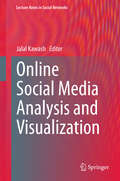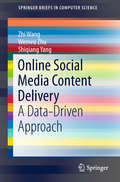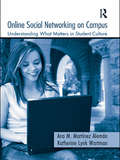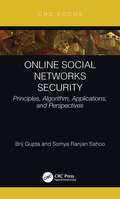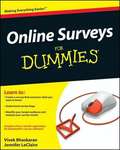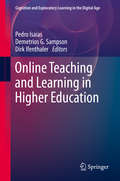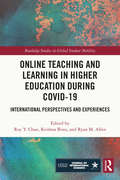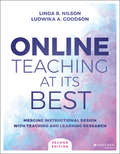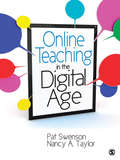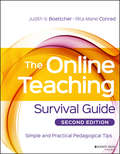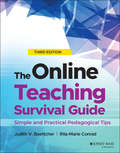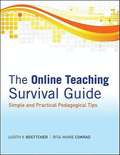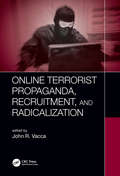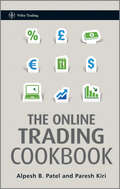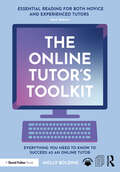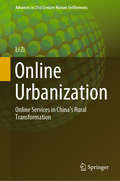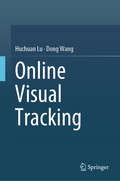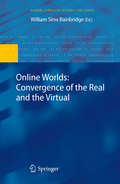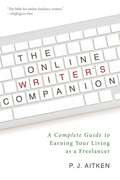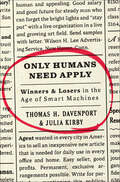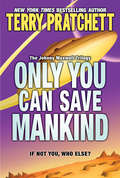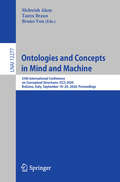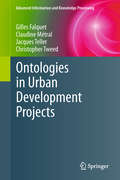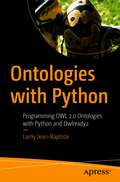- Table View
- List View
Online Social Media Analysis and Visualization
by Jalal KawashThis edited volume addresses the vast challenges of adapting Online Social Media (OSM) to developing research methods and applications. The topics cover generating realistic social network topologies, awareness of user activities, topic and trend generation, estimation of user attributes from their social content, behavior detection, mining social content for common trends, identifying and ranking social content sources, building friend-comprehension tools, and many others. Each of the ten chapters tackle one or more of these issues by proposing new analysis methods or new visualization techniques, or both, for famous OSM applications such as Twitter and Facebook. This collection of contributed chapters address these challenges. Online Social Media has become part of the daily lives of hundreds of millions of users generating an immense amount of 'social content'. Addressing the challenges that stem from this wide adaptation of OSM is what makes this book a valuable contribution to the field of social networks.
Online Social Media Content Delivery: A Data-Driven Approach (SpringerBriefs in Computer Science)
by Zhi Wang Wenwu Zhu Shiqiang YangThis book explains how to use a data-driven approach to design strategies for social media content delivery. It first introduces readers to how social information can be effectively gathered for big data analysis, which provides content delivery intelligence. Secondly, the book describes data-driven models to capture information diffusion in online social networks and social media content propagation and popularity, before presenting prediction models for social media content delivery. By addressing the resource allocation and content replication aspects of social media content delivery, the book presents the latest data-driven strategies. In closing, it outlines a number of potential research directions regarding social media content delivery.
Online Social Networking on Campus: Understanding What Matters in Student Culture
by Ana M. Martínez-Alemán Katherine Lynk WartmanIn the era of such online spaces as Facebook, Instant Messenger, Live Journal, Blogger, Web Shots, and campus blogs, college students are using these resources and other online sites as a social medium. Inevitably, this medium presents students with ethical decisions about social propriety, self disclosure and acceptable behaviour. Because online social networking sites have proven problematic for college students and for college administrators, this book aims to offer professional guidance to Higher Education administrators and policy makers. Online Social Networking on Campus: Understanding what matters in student culture is a professional guide for Higher Education faculty and Student Affairs administrators, which rigorously examines college students’ use of online social networking sites and how they use these to develop relationships both on and off campus. Most importantly, Online Social Networking on Campus investigates how college students use online sites to explore and makes sense of their identities. Providing information taken from interviews, surveys and focus group data, the book presents an ethnographic view of social networking that will help Student Affairs administrators, Information Technology administrators, and faculty better understand and provide guidance to the "neomillennials" on their campuses.
Online Social Networks Security: Principles, Algorithm, Applications, and Perspectives
by Brij B. Gupta Somya Ranjan SahooIn recent years, virtual meeting technology has become a part of the everyday lives of more and more people, often with the help of global online social networks (OSNs). These help users to build both social and professional links on a worldwide scale. The sharing of information and opinions are important features of OSNs. Users can describe recent activities and interests, share photos, videos, applications, and much more. The use of OSNs has increased at a rapid rate. Google+, Facebook, Twitter, LinkedIn, Sina Weibo, VKontakte, and Mixi are all OSNs that have become the preferred way of communication for a vast number of daily active users. Users spend substantial amounts of time updating their information, communicating with other users, and browsing one another’s accounts. OSNs obliterate geographical distance and can breach economic barrier. This popularity has made OSNs a fascinating test bed for cyberattacks comprising Cross-Site Scripting, SQL injection, DDoS, phishing, spamming, fake profile, spammer, etc. OSNs security: Principles, Algorithm, Applications, and Perspectives describe various attacks, classifying them, explaining their consequences, and offering. It also highlights some key contributions related to the current defensive approaches. Moreover, it shows how machine-learning and deep-learning methods can mitigate attacks on OSNs. Different technological solutions that have been proposed are also discussed. The topics, methodologies, and outcomes included in this book will help readers learn the importance of incentives in any technical solution to handle attacks against OSNs. The best practices and guidelines will show how to implement various attack-mitigation methodologies.
Online Surveys For Dummies
by Vivek Bhaskaran Jennifer LeclaireThe easy way to build effective online surveys for your business, with three months of free service! By targeting select response groups, online surveys are a great way to help your business, group, or organization get valuable feedback quickly. But with over 40 vendors and hundreds of options available, where do you start? This friendly book walks you step by step through the process of creating, launching, and getting results from an online survey. You'll learn about the tools involved, what results to expect, how to build a compelling survey, tips for identifying the right audience, and how to analyze the results. Discover What a survey is and how to put one together Survey lingo and a sample survey to study How to develop questions and assemble them into an attractive, easy-to-use interface that encourages response Tips for identifying and contacting the respondents you want to hear from The steps involved in making a usable analysis of the results Pitfalls to avoid, things to check out before launching a survey, and best practices With the book, you'll also receive three months of free service from a top survey vendor to get you started.
Online Teaching and Learning in Higher Education (Cognition and Exploratory Learning in the Digital Age)
by Dirk Ifenthaler Pedro Isaias Demetrios G. SampsonThis book is to explores a variety of facets of online learning environments to understand how learning occurs and succeeds in digital contexts and what teaching strategies and technologies are most suited to this format. Business, health, government and education are some of the core sectors of society which have been experiencing deep transformations due to a generalized digitalization. While these changes are not novel, the swift progress of technology and the rising complexity of digital environments place a focus on the need for further research and novel strategies. In the context of education, the promise of increased flexibility and broader access to educational resources is impelling much of higher education’s course offerings to online environments. The 21st century learner requires an education that can be pursued anytime and anywhere and that is more aligned with the demands of a digital society. Online education not only assists students to success-fully integrate a workforce that is increasingly digital, but it helps them to become more comfortable with the use of technology in general and, hence, more prepared to be prolific digital citizens. The variety of settings portrayed in this volume attest to the unlimited opportunities afforded by online learning and serve as valuable evidence of its benefit for students’ educational experience. Moreover, these research efforts assist a more comprehensive reflection about the delivery of higher education in the context of online settings.
Online Teaching and Learning in Higher Education during COVID-19: International Perspectives and Experiences (Routledge Studies in Global Student Mobility)
by Roy Y. Chan Krishna Bista Ryan M. AllenThis timely volume documents the immediate, global impacts of the coronavirus pandemic (COVID-19) on teaching and learning in higher education. Focusing on student and faculty experiences of online and distance education, the text provides reflections on novel initiatives, unexpected challenges, and lessons learned. Responding to the urgent need to better understand online teaching and learning during the COVID-19 pandemic, this book investigates how the use of information and communication technologies (ICT) impacted students, faculty, and staff experiences during the COVID-19 lockdown. Chapters initially look at the challenges faced by universities and educators in their attempts to overcome the practical difficulties involved in developing effective online programming and pedagogy. The text then builds on these insights to highlight student experiences and consider issues of social connection and inequality. Finally, the volume looks forward to asking what lessons COVID-19 can offer for the future development of online and distance learning in higher education. This engaging volume will benefit researchers, academics, and educators with an interest in online teaching and eLearning, curriculum design, and more, specifically those involved with the digitalization of higher education. The text will also support further discussion and reflection around pedagogical transformation, international teaching and learning, and educational policy more broadly.
Online Teaching at Its Best: Merging Instructional Design with Teaching and Learning Research
by Linda B. Nilson Ludwika A. GoodsonBring pedagogy and cognitive science to online learning environments Online Teaching at Its Best: Merging Instructional Design with Teaching and Learning Research, 2nd Edition, is the scholarly resource for online learning that faculty, instructional designers, and administrators have raved about. This book addresses course design, teaching, and student motivation across the continuum of online teaching modes—remote, hybrid, hyflex, and fully online—integrating these with pedagogical and cognitive science, and grounding its recommendations in the latest research. The book will help you design or redesign your courses to ensure strong course alignment and effective student learning in any of these teaching modes. Its emphasis on evidence-based practices makes this one of the most scholarly books of its kind on the market today. This new edition features significant new content including more active learning formats for small groups across the online teaching continuum, strategies and tools for scripting and recording effective micro-lectures, ways to integrate quiz items within micro-lectures, more conferencing software and techniques to add interactivity, and a guide for rapid transition from face-to-face to online teaching. You’ll also find updated examples, references, and quotes to reflect more evolved technology. Adopt new pedagogical techniques designed specifically for remote, hybrid, hyflex, and fully online learning environments Ensure strong course alignment and effective student learning for all these modes of instruction Increase student retention, build necessary support structures, and train faculty more effectively Integrate research-based course design and cognitive psychology into graduate or undergraduate programs Distance is no barrier to a great education. Online Teaching at Its Best provides practical, real-world advice grounded in educational and psychological science to help online instructors, instructional designers, and administrators deliver an exceptional learning experience even under emergency conditions.
Online Teaching in the Digital Age
by Professor Patricia Jane Swenson Professor Nancy Annette TaylorOnline Teaching in the Digital Age by Pat Swenson and Nancy Taylor provides educators with the essential knowledge needed to successfully develop and teach an online course. Throughout this practical hands-on guide, the authors offer 15 years of personal online teaching experience in language accessible to both the novice and advanced online educator. Developed through theory and practice, the text shows educators how to take the materials used in a traditional classroom and transfer them to a new virtual environment.
The Online Teaching Survival Guide: Simple and Practical Pedagogical Tips
by Judith V. Boettcher Rita-Marie ConradEssential reading for online instructors, updated to cover new and emerging issues and technologies The Online Teaching Survival Guide provides a robust overview of theory-based techniques for teaching online or technology-enhanced courses. Covering all aspects of online teaching, this book reviews the latest research in cognitive processing and related learning outcomes while retaining a focus on the practical. A simple framework of instructional strategies mapped across a four-phase timeline provides a concrete starting point for both new online teachers and experienced teachers designing or revamping an online course. Essential technologies are explored in their basic and expanded forms, and traditional pedagogy serves as the foundation for tips and practices customized for online learning. The tips cover course management, social presence, community building, integration of new technologies, discussion and questioning techniques, assessment, and debriefing, along with new coverage of intensive or accelerated courses, customizing learning strategies, developing expertise, advanced course design, and assessment techniques exclusive to this new second edition. The theory and techniques of successful online teaching can be significantly different from those used face-to-face. With more and more classes being offered online, this book provides a valuable resource for taking your course to the next level. Understand the technology used in online teaching Learn specialized pedagogical tips and practices Examine new research on cognition and learning Adopt a clear framework of instructional strategies The explosion of online learning has created a demand for great online teachers. Increasingly, faculty who normally teach face-to-face are being asked to cover online courses—yet comprehensive pedagogical resources are scarce. The learning curve is huge, and faculty need a practical approach to course design and management that can be quickly and easily implemented. The Online Teaching Survival Guide provides that essential resource, with a customizable framework and deeper exploration of effective online teaching.
The Online Teaching Survival Guide: Simple and Practical Pedagogical Tips
by Judith V. Boettcher Rita-Marie ConradA timely update to the best-selling, practical, and comprehensive guide to online teaching The Online Teaching Survival Guide provides a robust overview of theory-based techniques for teaching online or technology-enhanced courses. This Third Edition is a practical resource for educators learning to navigate the online teaching sector. It presents a framework of simple, research-grounded instructional strategies that work for any online or blended course. This new edition is enhanced with hints on integrating problem-solving strategies, assessment strategies, student independence, collaboration, synchronous strategies, and building metacognitive skills. This book also reviews the latest research in cognitive processing and related learning outcomes. New and experienced online teachers alike will appreciate this book’s exploration of essential technologies, course management techniques, social presence, community building, discussion and questioning techniques, assessment, debriefing, and more. With more and more classes being offered online, this book provides a valuable resource for taking your course to the next level. Understand the technology used in online teaching and discover how you can make the most of advanced features in the tech you use Learn specialized pedagogical tips and practices that will make the shift to online teaching smoother for you and your students Examine new research on cognition and learning, and see how you can apply these research findings your day-to-day Adopt a clear framework of instructional strategies that will work in any online or blended setting Learn how to make the most of your synchronous online class meetings using flipped model techniques integrated with asynchronous conversation Recently, schools across the globe have experienced a shift to online courses and teaching. The theories and techniques of synchronous virtual online teaching are vastly different from traditional educational pedagogy. You can overcome the learning curve with this theory-based, hands-on guide.
The Online Teaching Survival Guide
by Rita-Marie Conrad Judith V. BoettcherThe Online Teaching Survival Guide provides an overview of theory-based techniques for online teaching or for a technology-enhanced course, including course management, social presence, community building, and debriefing. Based on traditional pedagogical theory, this resource integrates the latest research in cognitive processing and learning outcomes. From a practical approach, this guidebook presents instructional strategies in a four-phase timeline, suitable for any online or blended course. Faculty with little knowledge of educational theory and those well-versed in pedagogy will find this book a key to developing their practical online teaching skills.
Online Terrorist Propaganda, Recruitment, and Radicalization
by John R. VaccaOnline Terrorist Propaganda, Recruitment, and Radicalization is most complete treatment of the rapidly growing phenomenon of how terrorists’ online presence is utilized for terrorism funding, communication, and recruitment purposes. The book offers an in-depth coverage of the history and development of online "footprints" to target new converts, broaden their messaging, and increase their influence. Chapters present the emergence of various groups; the advancement of terrorist groups’ online presences; their utilization of video, chat room, and social media; and the current capability for propaganda, training, and recruitment. With contributions from leading experts in the field—including practitioners and terrorism researchers—the coverage moves from general factors to specific groups practices as relate to Islamic State of Iraq and the Levant (ISIL), and numerous other groups. Chapters also examine the lone wolf phenomenon as a part of the disturbing trend of self-radicalization. A functional, real-world approach is used regarding the classification of the means and methods by which an online presence is often utilized to promote and support acts of terrorism. Online Terrorist Propaganda, Recruitment, and Radicalization examines practical solutions in identifying the threat posed by terrorist propaganda and U.S. government efforts to counter it, with a particular focus on ISIS, the Dark Web, national and international measures to identify, thwart, and prosecute terrorist activities online. As such, it will be an invaluable resources for intelligence professionals, terrorism and counterterrorism professionals, those researching terrorism funding, and policy makers looking to restrict the spread of terrorism propaganda online.
The Online Trading Cookbook
by Alpesh B. Patel Paresh H. KiriThe Online Trading Cookbook is a unique resource for busy online traders of all levels, addressing the need amongst the growing number of those trading and investing from home for solid, low risk trading strategies which they can incorporate into a busy lifestyle. Suitable for all levels of retail trader and is supplemented by useful advice on the best trading tools, websites and brokers, the different markets available to trade, tips on risk and money management. The book is divided into sections based on levels of complexity and contains specific strategies used by profitable hedge funds as well as strategies used by other professionals, all of which can be implemented by private investors. The opening chapter discusses the professional tools traders will need, from multi-screen hardware, best websites, trading software, data services, brokers, trading products and the types of traders suited to each type of trading. The following chapters give concise novice, intermediate and advanced strategies for short and long term traders. The cookbook format is one of the most popular for teaching complicated subjects. Trading skills are presented and learnt as simply as recipes. This book provides exactly that from trading strategies to risk and money management. Each page presents as ingredients what the trader needs to do, the tools and the preparation with successful examples illustrated on the facing page. Both the proven format and its simplicity are compelling and unique in their application to trading. Written by two celebrated experts in the field, The Online Trading Cookbook is the perfect starting point for anyone wishing to learn to trade or for advanced traders wishing to further their knowledge.
The Online Tutor’s Toolkit: Everything You Need to Know to Succeed as an Online Tutor
by Molly BoldingThis book contains everything you need to know to get started as an online tutor. It covers the essentials of tutoring, choosing your tech and software, managing homework, and getting set up alongside detailed guidance focusing on each level of tuition. With techniques developed through research and first-hand experience, the author explains exactly how to turn existing subject knowledge into effective tutoring for students of all ages in a variety of subjects. Divided into two parts, the first answers the logistical questions facing every new tutor such as: what equipment do I need? Where can I apply? How much should I charge? The second half focuses on how to tutor different age groups effectively and subject-specific areas including English, Maths, and Science, as well as the author’s tried-and-tested ‘5 step’ process for choosing a subject, assessing a student, and planning their first lessons. There is also information on how to support students writing personal statements and applying to university, as well as teaching English as a Second Language. Alongside tailored, up-to-date information on available software, hardware, exam specifications, and the online tutoring marketplace, the book contains a 10-week timetable of adaptable lesson plans so new tutors can get started immediately. Finally, there are two additional downloadable chapters which expand on less common subjects and another which includes a digital download of every resource from the book. With suggestions for resources, homework, and timings to support you at every stage, this is an essential read for anyone wanting to succeed as an online tutor.
Online Urbanization: Online Services in China’s Rural Transformation (Advances in 21st Century Human Settlements)
by Li ZiThis book highlights the new urban–rural relationship that has emerged under the influence of e-commerce in China. In this regard, it presents case studies on the Suichang rural e-commerce model and Alibaba’s rural strategy, together with analyses of online service in China. Furthermore, by means of a brief review of the urban–rural relationship throughout China’s history, and of academic literature on the study of space, it explains the special logic of urbanization in China. As such, the book makes a valuable contribution to the body of literature on the space of flows and grassrooting, aspects that are essential to appreciating the complexity of the new urban–rural relationship in underdeveloped areas (including developing countries and underdeveloped areas in developed countries) in the ongoing information era.
Online-Verkauf. Wie man mit dem Verkauf auf eBay, Amazon, Fiverr und Etsy Geld verdient
by Tetyana Schindler Nick Vulich"Online-Verkauf" ist deine schrittweise Anleitung zum E-Commerce-Erfolg. Dieses Buch stellt dir die großen vier Online-Plattformen vor: eBay, Amazon, Fiverr und Etsy. Möchtest du lernen, wie man online verkauft? Der Autor, Nick Vulich, hat in den letzten vierzehn Jahren über 29.000 Transaktionen auf eBay abgeschlossen. Er kennt alle Details des Verkaufs auf eBay, Amazon und Fiverr in- und auswendig und bietet dir an, dich bei der Hand zu nehmen und durch den Verkaufsprozess zu führen. Bist du neu beim E-Commerce? Schlägst du dich gerade mit dem Versuch herum, zu entscheiden, wie du loslegen kannst? Nur keine Panik. Dieses Buch wird dich durch alles führen, was du wissen musst, um noch heute mit dem Online-Verkauf zu beginnen. Jeder träumt davon, online Geld zu verdienen. Wer hätte nicht gerne einen Job, bei dem man zu Hause im Schlafanzug oder in Unterwäsche arbeiten kann? Einen Job, wo du keinen Chef hast, der dir auf die Nerven geht und dir sagt, was, wie oder wann du etwas zu tun hast? Online-Verkauf kann all das und vieles mehr sein. Entgegen der weitverbreiteten Meinung ist es aber nicht so einfach. Du wirst zwar keinen Chef haben, der dich nervt und dir sagt, was du zu tun hast, aber du wirst härter arbeiten müssen als du es jemals in deiner normalen Arbeit getan hast. Du wirst knapp bei Kasse sein, besonders am Anfang. Nur weil du beschließt, deine Waren auf eBay, Amazon oder irgendeiner anderen Webseite anzupreisen, bedeutet das noch lange nicht, dass Käufer wie durch Zauberhand zu deinen Artikeln strömen und dich mit Geld überhäufen werden. Wie alles andere braucht ein erfolgreicher Verkauf von Produkten oder Dienstleistungen online seine Zeit. Jeder kann online Artikel auflisten und ein paar schnelle Verkäufe erzielen. Um jedoch ein erfolgreicher Online-Verkäufer zu sein, muss man diesen Prozess tagtäglich und Monat für Monat wiederholen.
Online Visual Tracking
by Huchuan Lu Dong WangThis book presents the state of the art in online visual tracking, including the motivations, practical algorithms, and experimental evaluations. Visual tracking remains a highly active area of research in Computer Vision and the performance under complex scenarios has substantially improved, driven by the high demand in connection with real-world applications and the recent advances in machine learning. A large variety of new algorithms have been proposed in the literature over the last two decades, with mixed success.Chapters 1 to 6 introduce readers to tracking methods based on online learning algorithms, including sparse representation, dictionary learning, hashing codes, local model, and model fusion. In Chapter 7, visual tracking is formulated as a foreground/background segmentation problem, and tracking methods based on superpixels and end-to-end deep networks are presented. In turn, Chapters 8 and 9 introduce the cutting-edge tracking methods based on correlation filter and deep learning. Chapter 10 summarizes the book and points out potential future research directions for visual tracking. The book is self-contained and suited for all researchers, professionals and postgraduate students working in the fields of computer vision, pattern recognition, and machine learning. It will help these readers grasp the insights provided by cutting-edge research, and benefit from the practical techniques available for designing effective visual tracking algorithms. Further, the source codes or results of most algorithms in the book are provided at an accompanying website.
Online Worlds: Convergence of the Real and the Virtual
by William Sims BainbridgeVirtual worlds are persistent online computer-generated environments where people can interact, whether for work or play, in a manner comparable to the real world. The most popular current example is World of Warcraft, a massively multiplayer online game with eleven million subscribers. However, other virtual worlds, notably Second Life, are not games at all but internet-based collaboration contexts in which people can create virtual objects, simulated architecture, and working groups. This book brings together an international team of highly accomplished authors to examine the phenomena of virtual worlds, using a range of theories and methodologies to discover the principles that are making virtual worlds increasingly popular, and which are establishing them as a major sector of human-centred computing.
The Online Writer?s Companion: A Complete Guide to Earning Your Living as a Freelancer
by P. J. AitkenEvery year, millions of writers struggle to find work, and most make little more than spare change from the assignments they land. With the expansion of the online freelance marketplace, anyone with the right skills can learn to thrive and build a full-time career as a freelance writer. Author P. J. Aitken shares with readers what those skills are-the same skills that have earned him high levels of success on Upwork and other online freelance platforms. His tips include:Creating the perfect profileWriting winning proposals when bidding on writing jobsGarnering the rating system that will bring recognition and new clientsEstablishing long-term clientsOutsourcing for the most efficient resultsBlogging-for pay!Navigating the best sites and avoiding pitfalls many writers fall intoThe Online Writer’s Companion is an unprecedented and indispensable guide for aspiring writers and authors of various materials and backgrounds, from bloggers to professional writers, students to retirees. It can even touch freelancers in other trades who want to hone their skills. By learning to make the most of a myriad of websites for freelance writers, readers will finally have the knowledge to succeed!Allworth Press, an imprint of Skyhorse Publishing, publishes a broad range of books on the visual and performing arts, with emphasis on the business of art. Our titles cover subjects such as graphic design, theater, branding, fine art, photography, interior design, writing, acting, film, how to start careers, business and legal forms, business practices, and more. While we don't aspire to publish a New York Times bestseller or a national bestseller, we are deeply committed to quality books that help creative professionals succeed and thrive. We often publish in areas overlooked by other publishers and welcome the author whose expertise can help our audience of readers.
Only Humans Need Apply: Winners & Losers in the Age of Smart Machines
by Thomas H. Davenport Julia KirbyAn invigorating, thought-provoking, and positive look at the rise of automation that explores how professionals across industries can find sustainable careers in the near future.Nearly half of all working Americans could risk losing their jobs because of technology. It’s not only blue-collar jobs at stake. Millions of educated knowledge workers—writers, paralegals, assistants, medical technicians—are threatened by accelerating advances in artificial intelligence.The industrial revolution shifted workers from farms to factories. In the first era of automation, machines relieved humans of manually exhausting work. Today, Era Two of automation continues to wash across the entire services-based economy that has replaced jobs in agriculture and manufacturing. Era Three, and the rise of AI, is dawning. Smart computers are demonstrating they are capable of making better decisions than humans. Brilliant technologies can now decide, learn, predict, and even comprehend much faster and more accurately than the human brain, and their progress is accelerating. Where will this leave lawyers, nurses, teachers, and editors?In Only Humans Need Apply, Thomas Hayes Davenport and Julia Kirby reframe the conversation about automation, arguing that the future of increased productivity and business success isn’t either human or machine. It’s both. The key is augmentation, utilizing technology to help humans work better, smarter, and faster. Instead of viewing these machines as competitive interlopers, we can see them as partners and collaborators in creative problem solving as we move into the next era. The choice is ours.
Only You Can Save Mankind (Johnny Maxwell Trilogy #1)
by Terry PratchettThe alien spaceship is in his sights. His finger is on the Fire button. Johnny Maxwell is about to set the new high score on the computer game Only You Can Save Mankind. <P><P>Suddenly:We wish to talk. <P><P>Huh? <P><P> We surrender. <P><P>The aliens aren't supposed to surrender -- they're supposed to die! Now what is Johnny going to do with a fleet of alien prisoners who know their rights under the international rules of war and are demanding safe-conduct? It's hard enough trying to save Mankind from the Galactic Hordes. It's even harder trying to save the Galactic Hordes from Mankind. <P><P>But it's just a game, isn't it? Isn't it? <P><P>Master storyteller Terry Pratchett leaves readers breathless -- with laughter, and with suspense -- in a reality-bending tale of virtual heroism.
Ontologies and Concepts in Mind and Machine: 25th International Conference on Conceptual Structures, ICCS 2020, Bolzano, Italy, September 18–20, 2020, Proceedings (Lecture Notes in Computer Science #12277)
by Mehwish Alam Tanya Braun Bruno YunThis book constitutes the proceedings of the 25th International Conference on Conceptual Structures, ICCS 2020, held in Bolzano, Italy, in September 2020.* The 10 full papers, 5 short papers and 1 poster paper presented were carefully reviewed and selected from 24 submissions. The proceedings also include two keynotes and two tutorials. The papers focus on the representation of and reasoning with conceptual structures in a variety of contexts. The topics of this year's conference range from formal concept analysis to decision making, from machine learning to natural language processing. *The conference was held virtually due to the COVID-19 pandemic.
Ontologies in Urban Development Projects
by Jacques Teller Claudine Métral Christopher Tweed Gilles FalquetOntologies are increasingly recognized as essential tools in information science. Although the concepts are well understood theoretically , the practical implementation of ontologies remains challenging. In this book, researchers in computer science, information systems, ontology engineering, urban planning and design, civil and building engineering, and architecture present an interdisciplinary study of ontology engineering and its application in urban development projects. The first part of the book introduces the general notion of ontology, describing variations in abstraction level, coverage, and formality. It also discusses the use of ontologies to achieve interoperability, and to represent multiple points of view and multilingualism. This is illustrated with examples from the urban domain. The second part is specific to urban development. It covers spatial and geographical knowledge representation, the creation of urban ontologies from various knowledge sources, the interconnection of urban models and the interaction between standards and domain models. The third part presents case studies of the development of ontologies for urban mobility, urban morphological processes, road systems, and cultural heritage. Other cases report on the use of ontologies to solve urban development problems, in construction business models, building regulations and urban regeneration. It concludes with a discussion of key challenges for the future deployment of ontologies in this domain. This book bridges the gap between urban practitioners and computer scientists. As the essence of most urban projects lies in making connections between worldviews, ontology development has an important role to play, in promoting interoperability between data sources, both formal (urban databases, Building Integrated Models, Geographical Information Systems etc.) and less formal (thesauri, text records, web sources etc.). This volume offers a comprehensive introduction to ontology engineering for urban development. It is essential reading for practitioners and ontology designers working in urban development.
Ontologies with Python: Programming OWL 2.0 Ontologies with Python and Owlready2
by Lamy Jean-BaptisteUse ontologies in Python, with the Owlready2 module developed for ontology-oriented programming. You will start with an introduction and refresher on Python and OWL ontologies. Then, you will dive straight into how to access, create, and modify ontologies in Python. Next, you will move on to an overview of semantic constructs and class properties followed by how to perform automatic reasoning. You will also learn about annotations, multilingual texts, and how to add Python methods to OWL classes and ontologies. Using medical terminologies as well as direct access to RDF triples is also covered. Python is one of the most used programming languages, especially in the biomedical field, and formal ontologies are also widely used. However, there are limited resources for the use of ontologies in Python. Owlready2, downloaded more than 60,000 times, is a response to this problem, and this book is the first one on the topic of using ontologies with Python.What You Will LearnUse Owlready2 to access and modify OWL ontologies in PythonPublish ontologies on dynamic websitesPerform automatic reasoning in PythonUse well-known ontologies, including DBpedia and Gene Ontology, and terminological resources, such as UMLS (Unified Medical Language System)Integrate Python methods in OWL ontologies Who Is This Book ForBeginner to experienced readers from biomedical sciences and artificial intelligence fields would find the book useful.
